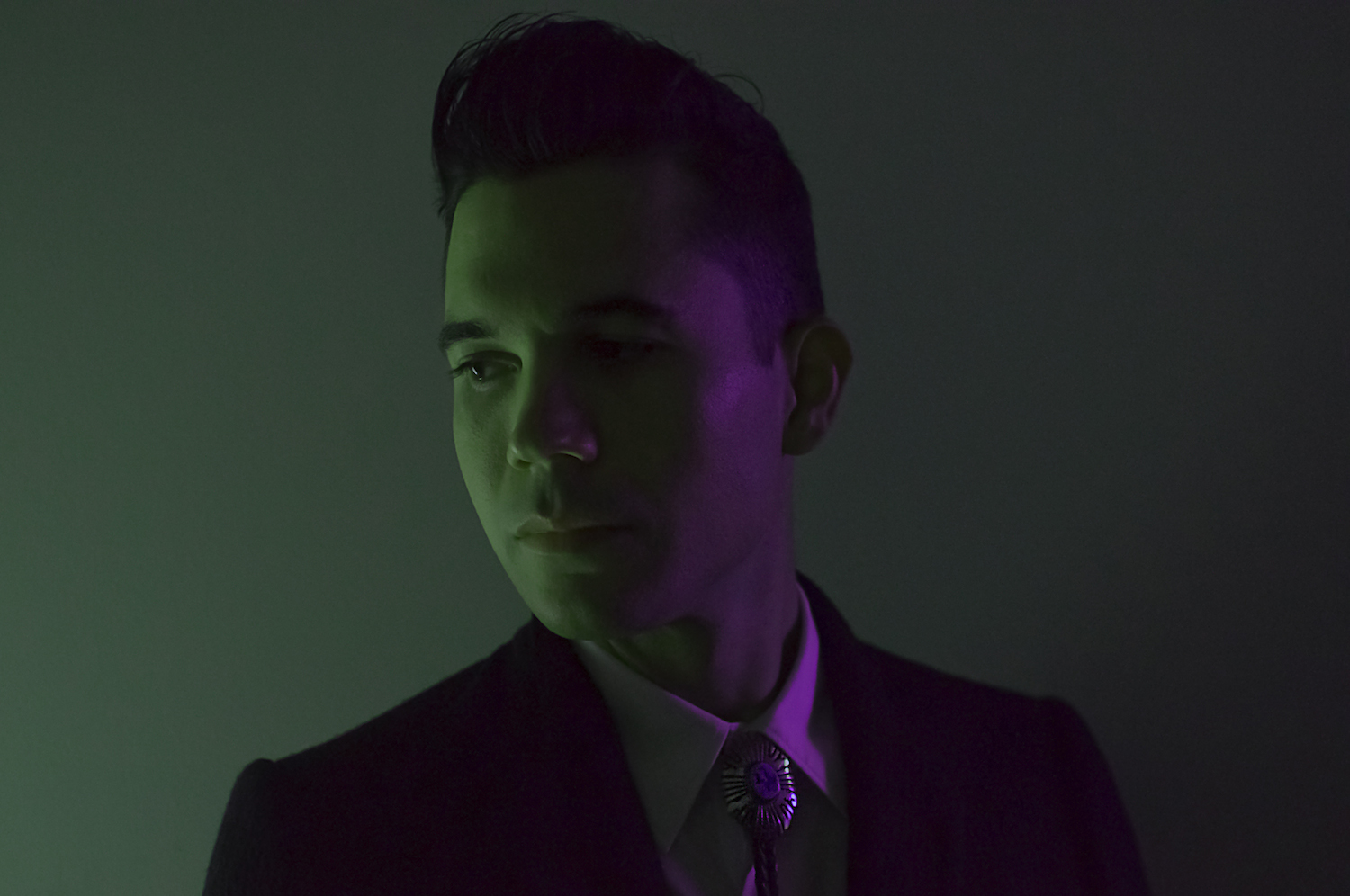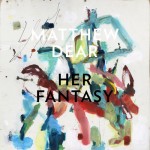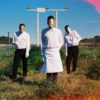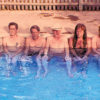Words ANDREW PARKS
“I guess I’ve always been searching for a return to simplicity and a life that is functional,” says Matthew Dear, speaking from the upstate New York home he set to leave later this month. “I mean, it’s amazing right now; I’m sitting in my yard, it’s probably about 72 degrees, there’s this beautiful fall breeze and the pine trees are swaying. That’s amazing but the hardships of getting to and from this place doesn’t add up or make sense.”
That’s one of the reasons why Dear will soon move back to Ann Arbor, Michigan, the same area where he met Sam Valenti 15 years ago and co-founded Ghostly International and its sister imprint, the club-calibrated Spectral Sound. After spending several years in Brooklyn and a converted barn two hours away, he hopes to finally have a proper home base and wrap up the Audion album that was originally meant to drop this year. Not to mention launch the ambitious “Subverticul” tour that’s been developed in tandem with Vita Motus, the same audiovisual team that worked on Amon Tobin’s acclaimed ISAM show.
“It’s funny,” explains Dear, “you take for granted what was streamlined in the past when you do something as drastic as moving in the middle of nowhere. You quickly realize how much you’ve thrown that life out the window.”
In the following exclusive interview—conducted to coincide with the latest edition of Dear’s Brooklyn residency “Subversions,” which hits Verboten on Saturday with Daniel Avery and Roman Flügel—we discuss everything from the inescapable siren calls of Detroit to the “amorphous, changing blog of music” that is the new Audion record…
You had a lot of big plans heading into this year but haven’t said much about them since the spring. What’s the status of your new Audion album and live show? Are they almost ready?
Yeah—life carries on, with or without albums. It’s something I want to be perfect, you know? At least as perfect as I can make it. I’m so good at making soundscapes, pieces of songs and loops, but when I have to really lock it all in and make a song, it’s kinda been, not overwhelming or a struggle … I kind of see it as this mundane format, where I’m so concentrated on the live show and dedicate so many loops to that—here’s two minutes of this song, or a minute and a half of that song. And that sounds good to me.
So it’s some of that, but there’s also been projects like the GE campaign I did recently; that ended up taking up two months of production time that wasn’t planned for. And the other thing I’ve been doing is producing music for Tiga. He’s been coming out and working in the studio here. I’ve kinda dedicated the last year and a half to getting his album set up.
It’s funny; I always wanted to do the stuff I’ve been doing—soundscape projects or production for other artists like Tiga—but it quickly becomes apparent that your music kinda takes a backseat.
“The older we get, the more our interests start to diverge… Maybe that’s why there’s no Audion album”
Tiga’s music has changed quite a bit over the years. What does his new record sound like? Is he focusing more on singing and melodies, while you do most of the beats for him?
For the most part, that’s what it’s like. Tiga is such a chameleon, but in a good way. Some people do that and look like they’re just trying to fit in with what’s fresh. But he’s always one or two steps ahead of that curve. And he’s just so hungry to always put out music in some format. So working with him was definitely eye-opening for me. In terms of how we make stuff, he usually brings a rough template to me and says, ‘Here’s the general idea; what can we do to make this better and turn this into a real song?’ Then we’ll just sit there for half a day and play with new drum beats or synth sounds, and I’ll put in my two cents and he’ll slap my wrist where it’s necessary. It ends up being really cool.
We were acquaintances before but we’ve never been forced to sit down with each other in a room and do something like this. It ended up as a really healthy relationship, because he knows when to push me and I know when to pull him back from getting a little too formulaic with it. Because Tiga sees formulas; he sees numbers and has this science in his head of, ‘Okay, this song needs to be like this.’ I’m totally not like that. I’m more free-wheeled in the other direction, which can be detrimental to me. But yeah, you put the two of us together and it makes something good happen.
And this has been going on for a year and a half now?
Yeah, crazy. We started with this song “Plush” when I still lived in Brooklyn. But the album itself has been made since I moved upstate and set up a studio in the barn. He was our first guest. He came out the day after we had running water and plumbing installed. It wasn’t filtered yet, so we had to warn him: ‘Okay, you can take a shower, but don’t get the water in your mouth.’
Slowly but surely as he came back, I had more things set up. So it kinda became his album—this place. We’re moving now, back to Michigan. So the main thing born from this barn, musically, was his album.
How much of your own music got done there?
Well I created the live show, and the first winter we were here, I did about 15 tracks for the Audion album. They’re finished but they’re not completely what I feel the album is supposed to sound like. It was kinda a big testing ground. Some of it stuck, like “Motormouth” and “Sky,” the two songs we released from the Audion [X compilation]. Those were done here, but yeah, I learned a lot more about how to build a house—how to order toilets and install sinks. A lot of my free time and creativity was spent on designing the interior of the house.
What are you going to do with the house now that you put all this work into it?
We’ve essentially sold it, so we’re moving next week.
Well everyone wants to move upstate now and have this nice getaway from the city.
With New York, if you still have one foot firmly planted in Brooklyn or Manhattan, it’s great. For us, I envisioned that happening, but the more we were here, the less I was in the city and the harder it was to justify going back just for a coffee or a meet-up. So it didn’t make sense anymore and we grew further and further from the city lifestyle. Without a doubt, I love New York City, and I could see moving there again in the future, but we have a massive living space here—in an old barn with vaulted ceilings, and about 4,500 square feet of living space. If I could transfer this barn could Bushwick or Bed-Stuy, then by all means I’d be living in New York right now. But for the space I need, and the lifestyle I want right now—with lots of amenities I don’t have to pay an arm and a leg for—then New York is a little too much for me right now.
That drive back and forth can be a bummer, especially when you’re doing it every weekend, like many people do. So I can understand why you decided to spend most of your time upstate the last few years.
Totally. We loved the full-time thing. If I was an author, and I could work from home and mostly worry about turning in my manuscript, that would be fine. But the fact that I have to drive two to three hours from here to get to a major airport, and the same thing on the way back, got a little too taxing. It’s not the life I want to live. I don’t want to live in a car, spending all my time driving to airports.
Why did you decide to move back to Michigan? Because of family? I guess you’re from Texas originally but…
Yeah. I was between Austin and Ann Arbor. I chose Ann Arbor because of family support and also because Detroit has a great international airport. That’s where I lived during the first half of my career, when I was just getting started and traveling a lot. Having two flights a night to Amsterdam, Tokyo or London is pretty priceless.
How do you see your lifestyle changing when you move back to Ann Arbor? Will it just be similar to the way it was the last time you lived there? Or do you have an interest in getting involved in something outside music, like opening a restaurant or something else locally?
Well yeah, but then the Audion album won’t come out until 2016. [Laughs] But no, That’s the thing—the older we get, the more our interests start to diverge and we start realizing there’s a lot more we want to do with our free time. Maybe that’s why there’s no Audion album. To answer your question, I’d love to do something like that, but at what cost? I don’t want to move too far away from making music because that’s what I love to do.
Detroit’s always this siren that’s making you feel like it’s about to change and come out of the gutter. And every year, slowly but surely, it is pulling itself up. One day, I wouldn’t mind venturing into a business opportunity in Detroit or Ann Arbor. I love that area of the country. It feels like home to me still, even though Texas does as well. We’ll see what happens there but the main goal at the end of this year is full-on studio mode so I can get the album locked and loaded for a release next year, and the live tour routed and planned. We have one more Audion show in LA for the HARD festival right after Halloween. We’re going to leave it in LA then, and probably return before the end of the year to revamp it and change a few things physically with the screen.

That’s an ongoing process too; each show is a learning experience. It’s good to take notes and see what works and what needs some tweaking. Musically as well—my ideas keep changing in the studio. I like that it’s this amorphous, changing blob of music. Albums are great for press and PR; you need the album to sell a concept. Even though the accessibility of an album has totally changed, I really think people still need a grouping of songs as a calling card for a project. So there’s no doubt that I’ll have an album. In what sense will the album exist? Who knows? I might just want to release a collection of loops in bundles—a massive download people can just play with themselves, sort of this massive puzzle that’s been taken apart and allowed people to put it together as they see fit.
That just sounds like you want someone to do your work for you.
Yeah, of course. [Laughs] I’m not going to say anything that hasn’t been said about how music has changed over the last five or 10 years, but to ignore that and just keep trudging on, saying, ‘Oh, time for an album!’, that method almost seems artificial now. What’s the point when certain artists just put out a single and they can live off that for a year? Until they tour and put out another single, and they do it again? I’m not going to shave it down to that, but I would like Audion to be ongoing. The quicker it can get from my computer to the ears of people the better.
Has an overarching concept emerged for your record? Or are you still trying to figure that out?
There’s two ways to look at it. As I get older, I really like my techno to be more stripped down, moody, atmospheric, dark, grimy and weird. Very aggressive in certain ways but not in energy. But it doesn’t necessarily make people dance. That music doesn’t go down well at a festival for some reason. You need to think about the format in which you’re going to be presenting the music. So I have songs that are completely in that direction—toward the left—but I still have the need to make dance music. I like making 12-inch DJ records, things that’ll make people go crazy on the dancefloor. So it’s been a toss up between those two styles. It can’t just be one or the other.
You must have noticed how underground dance music has embraced more experimental, darker sounds in recent years though. There is a scene that supports that.
No doubt. I love guys like Andy Stott and Recondite, but the inner DJ in me is still saying I can’t get too weird. There has to be a groove. Audion has always been more dancefloor-based so a little bit of the struggle is how far I can push it without alienating it from what it initially stood for. I almost think I need to start another alias that’s somewhere between the stuff under my own name and the stuff as Audion. But that’s a separate conversation entirely. I’ve definitely thought about it.
Dance music has gotten quite big during the time you spent focusing on music as Matthew Dear. Has it been tough to figure out where Audion fits into today’s scene?
Oh yeah, it’s changing at light speed; these little subgenres pop up every year, and then they sound redundant by the next year. I don’t necessarily let that dictate the struggle of where to place Audion. When I DJ, there’s a formula that works so well, but I don’t make those songs in the studio. I don’t make these calculated techno songs. That’s never been my thing. I’d rather zone out and make a 13-minute odyssey that you essentially can’t play in a DJ set. So it’s a matter of cracking the whip on myself and making sure I don’t stray too far in one direction.
Is the new material still influenced by classic dance records from the ’80s and ’90s like you originally planned?
I’d say so. The way I work is I route everything together and I make what’s essentially a live jam. I like happy accidents. I like to just tweak knobs and see what melodies can be randomly generated. Once it sounds like, ‘Oh shit, that’s it!’, then I start recording in my computer and sit there for 15 or 20 minutes tweaking all the instruments individually, changing the filter parameters on some of the synths, muting some parts. Maybe if I’m feeling risky enough, I’ll start changing note parameters. Then it’s all a multi-track and I can start splicing things after the fact, highlighting certain loops and working backwards. That seems to work really well for me.

Audion’s always had this very urban, harsh sound to it, and yet, you’ve been living this very placid, rural lifestyle over the past couple years. How did you get in the right state of mind to write this music out in the barn?
There’s no doubt that my lifestyle now is way different than when I was 24 and just starting to make this Audion stuff. You have to get back into the right headspace. For me, the biggest factor is time of day. As much as I’d like to make a techno sun before sunset, it doesn’t work for me. I find the best techno is made after midnight, when I can sit there zoned out. A lot of your thoughts toward the end of the day are swirling around in your head, but in a more free-form state, whereas your thoughts in the morning are a bit more calculated. You’re thinking about your coffee and how you’re going to go about your day. So early day stuff in the studio is usually mixing and the technical side of the song, but if I can leave the creative process till the end of the night, that’s when I make my best techno.
How has the Subverticul show influenced your record?
What works there is being translated back to the album. I have all those pieces by themselves and can turn them into songs. I’m always working too; when I’m on the road, I’ll make new loops on my laptop at the hotel, to put into the show randomly.
Are you working with thousands of loops at any given time then?
My gosh, yeah; at least. The Audion stuff has essentially been happening since 2004, and I’m always working on tracks, whether I’m on tour or at home. So there’s hours and hours of music for me to pull from and insert into the show.
Did you feel like there was something missing in your life—another side of your personality or a form of release, maybe—when you were focusing more on your Matthew Dear material?
Not really. I’m extremely happy where that stuff is, and I’m excited to go back to it as well. I’m always thinking about the other side and hungry for something more than what I’m doing. I guess that’s the pull that keeps me motivated. So I’m really stoked to go back to that stuff when I’m done with this Audion campaign.
Have you written material for a Matthew Dear record here and there?
I had a bunch of stuff lined up before I started writing the first batch of Audion songs last winter so I’ve gone back and mixed some things. I’d say I have about five songs ready for the next album. I’ve put that on hiatus because the more I work on that, the less I’ll work on the Audion show.
What direction do you see that going? Over the years, it’s gone from being an electronic project with some vocals to more of a vocal-driven pop thing.
Yeah. With the band that I have, we ended on such a high note last year, opening shows for Depeche Mode in Europe. I think Rome was 80,000 people. To end there feels fantastic and leaves us all wanting a little bit more. I must keep working with these guys, because they’re so good and we work so well on the road together. I think I’ll make more songs now knowing I have these guys to play it. I’ve always wanted to get in with a band, so as soon as I get the [Michigan] studio set up, I may have them come and start writing songs with me.
It sounds like your GE project was very time-consuming and explored a different side of your music—things like soundscapes. How do you see that bleeding into Audion or your Matthew Dear material?
I’ve always included a few more atmospheric pieces on my albums. It’s fun to work in that format. Doing the thing with GE, you learn something from that even though it takes two months out of your career. It’s something I hadn’t done before—using this sound bank I’d never had access to for a soundtrack that’s going to be set to a film of sorts. And then I made tweaks and edits based on what the video is going to look like. It became a multimedia experience that taught me a lot. I’m sure I’ll take bits and pieces from that and transfer it to the next album. Maybe I’ll have some GE sounds on it as well.
Did you get to take some of them with you?
Absolutely. There’s thousands of samples. It’s like how I can take a Beatles song and mangle it to the point where you won’t know it’s from a Beatles album.
How was that project presented to you? It kinda reminds me of how James Murphy recently worked with IBM to turn the sounds from tennis matches into music.
It was pretty transparent from the beginning—using GE sounds to make a song. At no point in the process did I feel like I was making a commercial piece. And I’ll be the first to admit when something feels commercial. I mean, I licensed “Don and Sherri” to sell a Hummer. The money’s great, but you’re essentially just selling a car. This just felt like a cool collaborative process between me, Barbarian Group—the ad agency that spearheaded the project—and Missing Pieces, the folks who filmed the project. It was unusually ideal for this day and age.
“It’s nothing to glorify, where you say, ‘Oh, it’s sad that it happened but look, they can shoot a Batman movie here. It’s perfect.'”
You’ve been involved with Ghostly since the beginning. Do you guys have anything else planned for your fifteenth anniversary?
We have a party at Panorama Bar lined up for the end of this month. In terms of music, it’s just going to keep going. We’re in a really good spot right now. There’s no reason this won’t continue for another 15 years.
What’s your role at the label now?
It’s very minimal, at the fringes of A&R. I can bring artists that I find when I’m touring; if it’s worthy of being listened to by the rest of the guys, I’ll send it to them and we’ll have a pow wow about the music. In terms of day-to-day, I haven’t worked in the office since 2003 or 2004. Music took over.
People have a really romanticized view of Detroit, in a way that almost celebrates its decay. How do you think moving back to that area will affect your music?
That’s part of it, you know? That [Jim] Jarmusch movie that just came out is a glowing example of romanticizing that decay. And it looks like that, except for the vampires. It’s that kind of town—always on the edge, always on the brink of this revival. That stuff looks cool but families have lost their homes, and whole generations of families have been wiped out. Some of the best neighborhoods, and black-owned businesses, and jazz were completely obliterated when certain highways were built. A lot of this fallout can be blamed by certain big things that happened. It’s not just random. It’s nothing to glorify, where you say, ‘Oh, it’s sad that it happened but look, they can shoot a Batman movie here. It’s perfect.’
But, from all of that, art is spawned. Hardships are why we have Detroit techno, why we have the MC5 and this garage rock scene that produced Jack White in the ’90s. It’s an inspiring place to be, so long as you’re not there to milk or abuse it. I love the commitment people who live there have. They try to uphold the history of what happened and the scene musically. You can go to these bars and see a DJ with maybe 20 people, but it feels like everyone is clued in on the right thing for the right reasons. No one’s there to posture, show off or step on someone else’s toes. It’s about celebrating the music. That vibe’s always been there, so I’m really happy to be going back to that. It’s a siren that sings to everyone who’s there. It kinda makes you feel like you’re going to be the one that turns me around. That’s why the artists there care so deeply about it—because it really feels like the city belongs to you, and if you invest in it—if you hang out at the coffee shops downtown, if you start a business, if you start a night, if you’re the one that goes to the bar everyone says you shouldn’t go to because it’s dangerous—you feel like your commitment is going to change what’s going on in the city.
The way you describe Detroit sounds like the way someone describes a relationship with someone they need to ‘fix’.
Totally, but you’re still with them no matter what. Like, ‘Oh yeah, she hits me and makes it hard for me to be happy, but I can’t leave her.’ That’s Detroit.
So to bring things back to the party you’re doing at Verboten this week, is this something you’re going to continue to curate there?
Absolutely. In 2015, and I’m probably going to do some events around the country under the same [Subversions] guise. It’s a way of wrapping more of my DJing into the Audion world. The most important thing about it is it’s the first residency I’ve done in New York City. As soon as I toured the club, I said, ‘Where do I sign? Let me do something here as often as possible.’ It’s become this thing where I can book my friends and artists I appreciate and want to work with. The first one was Tiga and Tim Sweeney; the second one was Ryan Elliott and Trus’me. And the third one coming up now is Roman Flugel and Daniel Avery. There’ll be another one in December, before the end of the year, and we’ll do four or five more next year.
It’s been good. Everyone has been floored by it so far. The sound system at Verboten is fantastic. I enjoy playing there, and I stay until the end of the night, just listening to music. I don’t remember the last time I did that willingly.
One of the things people wrote a lot about in the past couple years is how New York’s clubs are moving out to Brooklyn. And it was unclear how that was going to work out, whether it would just turn into the same super-club vibe that ruined some of Manhattan’s parties. What have places like Output and Verboten done right?
If you look at clubs that succeed in Europe like, say, Robert Johnson in Frankfurt, Berghain in Berlin, or Fabric in London, they’re a family, a group of people who really care deeply not just about the music that gets played there but also about the artists that come. You build this network of people who become friends for life. That’s a key ingredient. If you’re into it just to make money and then turn around and sell it, then that can be immediately felt by everyone involved.
When I first went to Verboten and talked to Jen Schiffer—Verboten’s kinda owner/operator—I stuck around for the opening prep talk with her crew. She said, ‘This is what I’m hearing from people on social media. This is what I’m hearing from friends. This is what they like. This is what they didn’t like. We have to make sure we treat people the right way.’ And she’s talking to bouncers like this, essentially saying, ‘Don’t ruin this. You’re as much the face of this club as anyone else.’ I don’t think that happens at a lot of places. Knowing that it’s going through all the employees, there’s no doubt you’re going to feel that vibe. You’re gonna know that the bartender is on your side, and they want you to have a great night. It’s not about selling you this expensive drink and thinking, ‘I can’t wait for you to leave so I can go home.’ If Jen keeps up that vibe, there’s no reason it can’t have the longevity of the other clubs I mentioned.
So what are your tentative plans moving forward, just to wrap things up?
We’re going to do that last live show in LA on the Day of the Dead, then we’re going to go back on the road next year and do the whole circuit. Album wise, most likely mid next year. I do have some things lined up in terms of getting the music out there sooner, so some of it will be trickling out leading up to the album.
And the Tiga album is almost done?
We have two more songs we need to wrap up but hopefully it’ll come out soon.
How does it sound? All over the place?
Yes, in the same sense that all of his albums are, not neurotic or lost by any means. Tiga’s albums are always reflective of his influences at the time.
Which is what lately? That’s pretty vague.
[Laughs] I know. I should leave that up to him.




